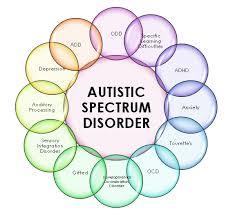Autism Spectrum Disorder (ASD)

Autism spectrum disorder (ASD) is a neurological and developmental disorder that begins early in childhood and lasts throughout a person's life. It affects how a person acts and interacts with others, communicates, and learns. It includes what used to be known as Asperger syndrome and pervasive developmental disorders.
It is called a "spectrum" disorder because people with ASD can have a range of symptoms. People with ASD might have problems talking with you, or they might not look you in the eye when you talk to them. They may also have restricted interests and repetitive behaviors. They may spend a lot of time putting things in order, or they may say the same sentence again and again. They may often seem to be in their "own world."
At well-child checkups, the health care provider should check your child's development. If there are signs of ASD, your child will have a comprehensive evaluation. It may include a team of specialists, doing various tests and evaluations to make a diagnosis.
The causes of ASD are not known. Research suggests that both genes and environment play important roles.
There is currently no one standard treatment for ASD. There are many ways to increase your child's ability to grow and learn new skills. Starting them early can lead to better results. Treatments include behavior and communication therapies, skills training, and medicines to control symptoms.


